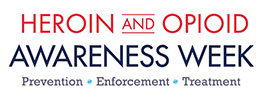Press Release
U.S. Attorney Deirdre M. Daly on the Opioid Epidemic
For Immediate Release
U.S. Attorney's Office, District of Connecticut

The Perfect Storm
Twenty-three-year-old Louis Ahearn was not a heroin addict. Until shortly before his death earlier this year, the Derby resident had never used the drug. A dental procedure and a short search for relief from his pain led him to a local drug dealer who convinced him that heroin was a far cheaper alternative to prescription pills. Two weeks later, the same dealer gave Louis a free bag as payment for a ride. That bag turned out to contain pure fentanyl. Louis died. He was a gentle soul and the light of many lives. The young dealer who gave him the fentanyl is now serving a six-year term in federal prison, while Louis’s family still searches for answers, like so many other families across Connecticut who have experienced similar tragedies.
In 2012, 357 Connecticut residents died from accidental drug overdoses. Fentanyl played a part in only 14 of those deaths; heroin contributed to 195 of the overdose deaths. In 2016, the dynamics have radically changed for the worse. The Connecticut Office of the Chief Medical Examiner estimates that this year 888 people will die from overdoses, pure heroin will cause only 80 of those deaths, and fentanyl will play a role in a staggering 446 of them. In Connecticut, fentanyl is the largest single contributor to the dramatic rise in opioid-related overdose deaths. This potent and lethal chemical is present in much of the heroin sold on our streets.
This dramatic rise in the use of fentanyl as an additive -- and even replacement for heroin -- comes at a time when opioids are prescribed at high rates for everything from school sports injuries to dental procedures. High school students have easy access to legally prescribed opiates. A sibling is injured in a football game. A friend has his wisdom teeth pulled. A parent is recovering from surgery. A neighbor has chronic back pain. There is no question this medicine can be an excellent tool for pain management, but it is also highly addictive. Four out of five new heroin users started with prescription opioids. As young people abuse opiates, their source of legally prescribed pills inevitably disappears, and they are left to scramble for alternatives. The street price for a 40 milligram oxycodone pill is $40, whereas a street-level heroin dealer distributes individual bags for as little as $5. The teenager who began experimenting with his father’s prescribed Vicodin has now developed a heroin habit. And more and more often, this heroin is mixed with, or replaced by, fentanyl.
In February 2016, the U.S. Attorney’s Office and the Drug Enforcement Administration developed a statewide initiative to combat this epidemic. Together with local police departments, we are investigating overdose deaths across the state and targeting dealers who sell heroin and fentanyl. We have developed a statewide protocol for handling evidence in overdose cases. In the past six months, the DEA has investigated more than 70 overdose deaths in Bridgeport, Danbury, Derby, East Haddam, Greenwich, Groton, Manchester, Middlebury, Middlefield, Monroe, New Haven, New London, Newtown, North Haven, Norwalk, Norwich, Old Saybrook, Shelton, Stamford, Stonington, Torrington, Vernon, Waterford, West Hartford, West Haven, Weston, and Woodbridge. These investigations have resulted in the federal prosecution of over 40 dealers.
But prosecutions alone will never adequately address the underlying problem that increasing numbers of young people quietly are becoming addicted to opioids. Our Office has dedicated significant resources to awareness and prevention, focusing our efforts on high school students and their parents. Across the state, we have encouraged superintendents and principals to incorporate into their curricula the recently-created FBI/DEA documentary entitled Chasing the Dragon, which chronicles the experiences of individuals impacted by the opioid crisis.
President Obama has designated this week Prescription Opioid and Heroin Epidemic Awareness Week in recognition of those we have lost and those struggling with addiction, and in the hope of creating greater awareness throughout our nation of this devastating epidemic. This week and in the weeks to come, our prosecutors will present at schools throughout the state as part of our awareness campaign. This Wednesday, September 21 at 5:30 p.m. at Kennedy High School in Waterbury, we will hold an opioid awareness conference that will include a panel of doctors, and a panel of parents who have lost children to overdoses. Our goal is to educate parents, teachers and students about the consequences of opioid abuse. All are welcome to attend.
Deirdre M. Daly
U.S. Attorney, District of Connecticut
September 19, 2016
Updated September 19, 2016
Component

 U.S. Department
of Justice
U.S. Department
of Justice